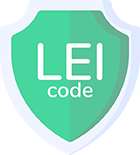The easiest way to pass Business & Extended Validation
A Legal Entity Identifier (LEI) is a unique 20-character code that identifies any worldwide business engaged accepting or performing financial payments. Defined by the ISO 17442 standard and sanctioned by the world’s major economies (G20), LEIs facilitate regulatory compliance and prove companies’ legitimacy.

About

- An LEI code is the #1 global identifier of legal entities.
- It is a bonafide indicator of a legitimate organization.
- LEIs authorize the compliance of cross-border transactions.
- LEI records are transparent and easily verifiable.
- LEI codes streamline reporting procedures to market regulators.

- Flexible plans and low prices
- Multi-year discounts
- Automated LEI application process and effortless management
- Around the clock dedicated support
- Around the clock dedicated support
Supported entities

Registered companies

Non Profit / Charity

Funds and Trusts

Government entities

Sole Proprietors

Branch offices
Features stats

Accredited GLEIF RA

2,552,999 LEI numbers globally

Speed-up SSL validation

Best Trust Identifier
LEI code structure
| 1 | 2 | 3 | 4 | 5 | 6 | 7 | 8 | 9 | 10 | 11 | 12 | 13 | 14 | 15 | 16 | 17 | 18 | 19 | 20 |
| LOU Identifier | Reserved characters | Entify Identifier | Verification ID | ||||||||||||||||
| Four character prefix allocated uniqely to each LOU | Two reserved characters set to zero | Entity-specific part of the code generated and assigned by LOUs acording to transparent, sound and robus allocation policies | Two check digits as described by ISO 17422 | ||||||||||||||||
How LEIs have improved the trade landscape?
In the aftermath of the 2007-2008 financial crisis, the need for a single identification code assigned to each financial institution worldwide was apparent. With each country using different code systems to identify counterparties, assessing risk exposure and resolving financial claims during an evolving crisis was a challenge for many organizations.
The solution came from G20, the leading forum for international economic cooperation. A unique code, aptly titled Legal Entity Identifier (LEI), would recognize each legal body and simplify transaction tracking in different jurisdictions. The first LEI code was issued in December 2012.
How LEIs have improved the trade landscape?

Who regulates LEIs?

Who regulates LEIs?
The international entity overseeing the assignment of codes to the Global LEI System (GLEIS) is the Regulatory Oversight Committee (ROC). To streamline GLEIS maintenance and development, ROC founded the Global LEI Foundation (GLEIF), an organization that certifies Local Operating Units (LOU) to assign LEI codes in different jurisdictions.
What can an LEI code identify?
An LEI code is the quickest way to determine the legal status of an organization. At first glance, LEI is just a string of 20 characters, but it’s the only code ubiquitously accepted by the global financial markets. All registered LEIs are listed in a public database and include the following data:
- Legal entity or fund’s manager official name;
- Registry name and registry number;
- Company’s legal form;
- ISO country code;
- Headquarters’ address;
- Date when the LEI was first issued;
- Date when the LEI expires;
- Date of the last change of information.
What can an LEI code identify?

Who needs an LEI code?
Any company that is a legal entity may obtain a Legal Entity Identifier and get indexed on the official LEI register. With new regulations authorizing LEI inclusions every month, more and more jurisdictions and industries require LEI codes. As of June 2021, over 120 regulations mandate LEIs both globally and locally. Among them are MiFID II, MiFIR, EMIR, FICOD, Dodd-Frank Act, and many others.
From tightly regulated industries such as banking and insurance to the private sector for which LEI codes aren’t even required, companies utilize LEIs for their powerful credibility boost and an added layer of security. If your company falls in one of the following categories (but not limited to) you’re required by law to register an LEI code.
- Charities;
- Bankers;
- Brokers;
- Fund managers;
- Traders;
- Institutional Investors;
- Exchange officials;
- Financial intermediaries.
- Association and branches;
- Government bodies;
- Investment companies and lenders;
- Limited Companies;
- Sole traders;
- Business Validation SSL owners;
- Extended Validation SSL owners.
LEIs – more than just a regulatory obligation
The mantra of LEI codes is “no LEI, no trade,” and while this statement is true, LEIs’ benefits go far beyond compliance. The Conformity Flag feature introduces an additional layer of accuracy by flagging the LEIs that passed all the data quality checks as active. This extension enhances Know-Your-Customer (KYS) security and fraud detection.
Along with essential “business card type” information, the LEI reference data includes details about the parent companies. As such, the LEI is the only identifier that answers the two most important questions: ‘who is who?’ and ‘who owns whom?’. It connects parent organizations and their subsidiaries in the most transparent manner possible.
LEIs – more than just a regulatory obligation

Both humans and applications can use LEI records

Both humans and applications can use LEI records
- The entire LEI database is accessible via web, API, or full dataset download. LEIs offer multilingual support for names and addresses, and are used in QR codes, bar codes, digital signatures, e-documents, site seals, and more.
- Human and machine-readable XBRL digital signatures utzilize LEIs for the utmost integrity of crucial documents such as financial statements and annual reports.
- You can use LEIs when applying for SSL/TLS certificates and speed up the issuance process.
LEIs in numbers
- Over 1.9 million organizations across the world have registered their LEIs as of July, 2021
- Entities based in the United States have the most LEIs in a single jurisdiction, with 12,9% of active LEI share. The UK (8.7%) and Germany (8.1%) complete the top three jurisdictions with the most registered LEIS.
- According to McKinsey, a global management consulting firm, the LEI system can save the banking industry between two to four billion USD annually in KYC checks.
LEIs in numbers

LEIs are the backbone of financial transactions

LEIs are the backbone of financial transactions
In an ever-changing world with challenges and potential crises just around the corner, LEIs offer organizations a predictable and secure means to carry on business as usual. The Legal Entity Identifier is the most important global indicator of a legitimate entity and is endorsed by hundreds of financial and economic regulators worldwide. Due to this peculiarity, LEI codes enable the easiest and fastest way of passing business or extended validation for any BV and EV SSL Certificate.




















